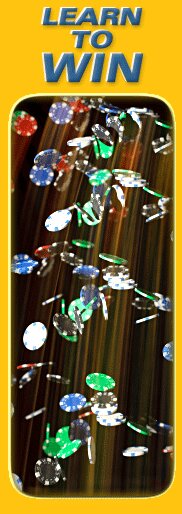Rummy Games Introduction
This Rummy Games lesson is part of the Learn Poker Games program and teaches the basics for the most popular card games ever.
These card games can aptly be defined as a family of games with a similar pattern or approach to playing–draw and discard style.
Rummy Games History
Defining the actual meaning of rummy is not easy – considering the fact that the game has a vast geographic history. Many believe that Rummy was conceived in New York in early 20th century and soon became Gin Rummy. Others feel that it has roots in the Oriental card games such as Mahjong. Still another theory is that Rummy was first played by the Spanish who came to the West and was quickly adopted by the elite players in America.
Rummy Games: Rules
Basics: The reason for the popularity of rummy is the uncomplicated rules that govern the game. Two to six players can play at once and the deck of cards used is the standard 52-card deck with the rank of cards starting from the King (highest) to queen, jack, and down to the Ace.
The dealer is usually decided by drawing a card from the deck.
The one with the lowest rank is the dealer and the person on his/her right has to cut the deck. The dealer then shuffles the deck and deals out the cards, one at a time in clockwise order.
If there are two players, then each gets 10 cards, 3 or 4 players get 7 cards each and 5 or 6 players get 6 cards each.
The objective of rummy is to get rid of all your cards by forming various combinations consisting of three of four cards. These are predetermined and standard combinations that may be either a sequence (a run) or a group (a set).
Examples are run=7-8-9 (same suit) or set=7-7-7 (same number).
The game starts with the player on the dealer’s left. He/she either picks a card from the discard pile or the stock pile.
If he/she wishes, he may discard a card (not the same if picked from the discard pile) to the discard pile, or form a combination (also called meld) and put it on the table. And the game moves on.
The other players may do the same or they may lay off which means that they may add a card to an existing meld on the table.
When the stock pile runs out, the topmost card on the discarded pile is set aside and the remaining cards are shuffled to form the new stockpile.
Rummy Games: Scoring
Calculated by cards remaining in hand – all face cards have 10 points each, aces equal 1 point and remaining cards have their pip value (a 9 of hearts has 9 points, 4 of spades 4 points, etc.) The person to lose all their cards first, wins the game.
A player has a Rummy when he/she disposes all the cards on hand in one go without laying off or melding before. In this case, each other player has to pay him double the owed amount.
Rummy Games: Strategies
Rummy is a strategy game that requires a good degree of skill, logic and memory to win. Basically, a player has to:
1. Deduce what type of runs or sets your opponents are trying to build and this can be done by memorizing the cards they discard or hold back.
2. To confuse your opponents, play high count cards in a such a way they cannot gauge what combination you are trying to pull off but be careful that you do not end up helping your opponents.
3. Strategically, middle numbered cards are more valuable as they can make many runs and sets. For example, a 5 can make a run with 456, 567 or 345, but an ace can only do so with A23.
Rummy Games: Versions
Some popular variations of rummy include:
Queen City Rum – this version makes it necessary for people to go rummy before melding. No double points are given.
Boat House Rum – Rules are same except that players are allowed to withdraw two cards at a time.
Kaluki – this variation includes two decks with jokers plus large melds and points for the winner.
Continental Rummy, Double Rum and Poker Rum are two other famous variations.
This lesson is followed by Rummy Quiz
OR
From Rummy Games, return to Learn Poker Games
Gambling Teachers Home
GT is attentive about getting the word out about our free programs, lessons and add-ons offered, however, we ask your assistance and consideration in promoting us.
Click link below that reads, "Enjoy this page? Please pay it forward. Here's how..." to add a link to your site, blog or personal page.
Tips, Terms & Wins
I Can Visit More Often Now
Vallerie Ohrt, an Air Force retiree from Shalimar, FL was on her way to Tunica, but decided on a detour. Her strategy is, “I always look at the jackpot meter when choosing which machines to play.” A second decision to play $100 at a Wheel of Fortune resulted in a new millionaire with a super big hit of a $1,173,178 MegaJackpot. “It was total glee,” Ohrt stated, “I will enjoy my winnings and will now be able to go to casinos more often.”





